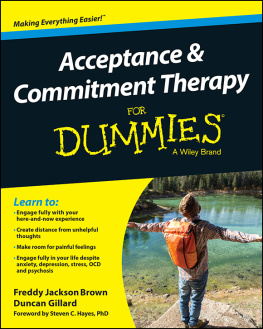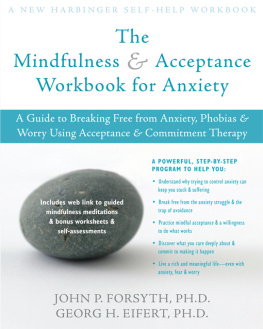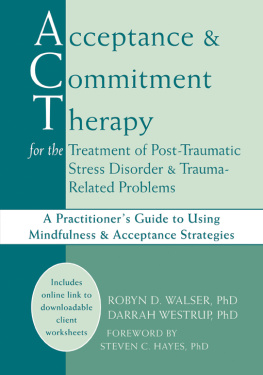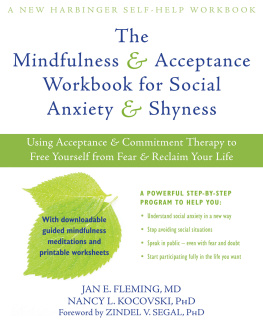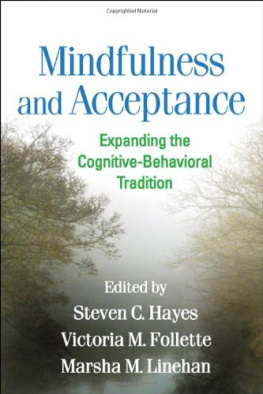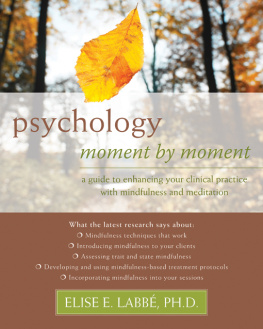
1. We acknowledge with gratitude Joanna Arch for her contributions to this section and her suggestions for wording and conducting the acceptance exercises.
2. We are grateful to Peter Thorne, a British clinical psychologist, for sharing this metaphor with us and allowing us to use it in this book. We are also grateful to Steven Hayes for the rewording of Just So Radio.
3. We are grateful to Dr. Michelle Craske for allowing us to use and adapt the scenarios and suggestions contained in her 2005 treatment manual Cognitive-Behavioral Treatment of Anxiety Disorders.
4. Some of the material in this chapter has been adapted from our ACT workbook for anorexia (Heffner & Eifert, 2004). It shows how many of the issues coming up in the ACT treatment of one clinical problem are similar to issues in other clinical problemsand how the solutions are similar in both cases, too.
In a nuanced and creative inversion of traditional approaches to the treatment of anxiety, Eifert and Forsyth offer clients the possibility of relinquishing their struggles with anxiety, by treating the struggle as the problem and letting fear play out to an increasingly disinterested audience of one. Acceptance, commitment, and mindfulness are essential to this process, and this book clearly lays the type of experiential learning foundation that allows clients to embody these concepts and, through their actions, develop a new relationship with their fears. This book will certainly become a vital clinical resource for any therapist, student or educator in the field of anxiety disorders.
Zindel V. Segal, Ph.D., the Morgan Firestone Chair in Psychotherapy and professor of psychiatry and psychology at the University of Toronto and author of Mindfulness-Based Cognitive Therapy for Depression
Eifert and Forsyth present the complexities and nuances of acceptance and commitment therapy for anxiety disorders in a fascinating and conceptually illuminating style and in a manner that is amply detailed to guide clinical practice. The principles that underlie acceptance and commitment therapyto relinquish attempts to control internal states and instead focus upon valued life directions and goalsare brought to life with excellent case examples throughout their step-by-step guide for treating anxiety disorders. This book will be an invaluable resource for theoreticians and clinicians, novice and experienced alike.
Michelle G. Craske, Ph.D., director of the Anxiety Disorders Behavioral Research Program at the University of California, Los Angeles and author of Origins of Phobias and Anxiety Disorders
Eifert and Forsyth have done something revolutionary! They have taken the treatment of anxiety disorders far beyond the disease model that CBT has been stuck in by brilliantly examining the core psychological processes that make fear and anxiety disordered and explaining in clear language what all anxiety disorders have in common. Their conceptualization of fear and anxiety demonstrates the cutting edge of clinical research and development within CBT and its development into the so-called third wave behavior therapies. The book contains innovative and user-friendly session-by-session guidelines on how to apply ACT for all the major anxiety disorders. This therapist guide should be on every clinical psychology programs reading list. It is truly an eye opener and a huge step forward in how we view and treat the suffering associated with anxiety disorders.
JoAnne Dahl, Ph.D., professor of clinical psychology at the University of Uppsala, Sweden, and author of Living Beyond Pain and Pain: A Vital Friend
Behavior therapy is undergoing extraordinary change. Mindfulness, acceptance, and values-oriented interventions are increasingly being included in interventions for a wide variety of problems in living. Eifert and Forsyths new anxiety text is a stunning example of the potential for this new wave of behavior therapies to remain connected to their scientific roots while exploring emerging treatment issues and technologies. This book is a must for the bookshelves of both clinicians and treatment developers.
Kelly G. Wilson, Ph.D., assistant professor of psychology at the University of Mississippi and coauthor of Acceptance and Commitment Therapy
This book provides concrete treatment guidelines that are firmly grounded in a new and intriguing approach to emotion regulation: Acceptance and Commitment Therapy. The authors are well known for their rigorous scientific studies and theoretical contributions to the field of anxiety disorders and behavior analysis. This book further demonstrates that they are highly skilled clinicians and masterful educators who are able to translate complex theories into simple and clearly formulated treatment techniques. The book is a reflection of the current paradigm shift from the studies of behaviors and cognitions to the study of and emotion regulation and, therefore, is a must-read for both the present and next generation of anxiety researchers.
Stefan G. Hofmann, Ph.D., associate professor of psychology at the Center for Stress and Anxiety-Related Disorders at Boston University, and Editor of Cognitive and Behavioral Practice.
Acceptance and Commitment Therapy for Anxiety Disorders provides a detailed, step-by-step account of how therapists can use ACT to help people who are suffering from these problems. Its comprehensiveness and session-by-session guides will help people who are novices to this approach understand and apply the fundamentals of ACT. Experienced ACT practitioners will also find this an extremely valuable resource, as Eifert and Forsyth have deftly tailored core ACT techniques to target the primary issues of people with anxiety-related problems. In addition, this book provides a considerable amount of new and innovative, out-of-session exercises and materials clients can use to strengthen their commitment to move through their anxiety and lead a vital life that they will value. In all, its a one-stop-shop ACT guide for treating anxiety disorders.
Frank Bond, BA, P.G.Dip., M.Sc., Ph.D., C.Psychol., ICTLHE, senior lecturer in the Department of Psychology at Goldsmiths College, University of London
This is an extremely useful book for professionals as well as educated clients. Focusing on the broad area of anxiety disorders, it does a superb job demonstrating how acceptance and commitment therapy can be applied to specific disorders. Avoiding the artificial constraints of DSM-IV or ICD-10 classifications of mental disorders, it emphasizes the functional similarities of the anxiety disorders and their common treatment strategies while at the same time taking into account some of their unique aspects.
Rainer F. Sonntag, MD, psychiatrist and psychotherapist in private practice in Olpe, Germany
Eifert and Forsyth are interpreters rather than the creators of acceptance and commitment therapy (ACT). So when they explain its value for the treatment of anxiety, they ground their commitment to this approach in their own extensive clinical and research experience in anxiety disorders, not in uncritical acceptance. Because they really understand the psychology of anxiety, they have produced an authoritative, beautifully written, usable manual for clinicians. Calling it a manual, however, belies its theoretical sophistication and its ability to inspire rather than stipulate. These properties make it particularly useful in diverse cultural and global contexts, where it can easily be molded to the real lives of real clients.
Ian M. Evans, Ph.D., professor and head of the School of Psychology at Massey University in Palmerston North, New Zealand, fellow of the American Psychological Association and the Royal Society of New Zealand, and author of
Next page



